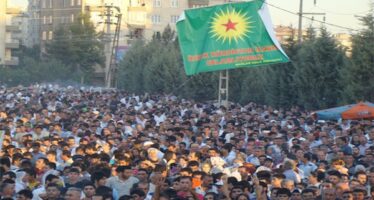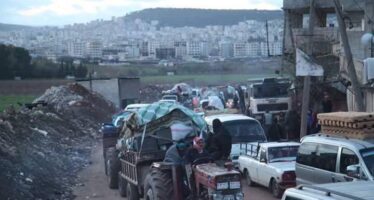Kürkçü: Gezi was an Uprising for the 21st Century
![]()
The BDP MP from Mersin, Ertu?rul Kürkçü, took part in a panel over the weekend as of part of the ongoing “Conversations on Rebellion” program at the Kumbara Art Workshop in the Pera district of Istanbul – according to an article in today’s Özgür Gündem. During the panel, which was entitled “From 1968 to the Gezi Resistance,” Kürkçü shared his thoughts and observations about the Gezi uprisings that began late last May in Istanbul and quickly spread throughout the country. Among a number of points, Kürkçü noted that the uprising was “a sudden, huge explosion” that not even the state or police were expecting and that kicked of a new era of social struggle and resistance throughout Turkey. He compared the spontaneous and unexpected nature of the uprising to the October Revolution, saying ‘No one in Russia believed that there would be a revolution on November 6th. But together with the take over of the Winter Palace on the night of November 6th-7th the fate of Russia changed.”
Kürkçü went on to stress, however, that the struggle that began in Gezi Park was not a coincidence, but a resistance over ecological concerns and for the right to the city that manifested itself in concrete form in opposition to the conditions surrounding Turkish capitalism’s attempts to reproduce itself over the past ten years. He underlined the fact that Gezi was an uprising suited to the 21st Century and was different from all the uprisings that had come before it, remarking “the workers movements of the 15-16th of June [1970] remained within the borders of Istanbul and Izmit. Whereas the Gezi resistance was a resistance that spread to every region of Turkey. In this sense Gezi does not resemble them. The unemployed rebelled because they had no future. What we saw was a labor struggle. In Gezi there were people from every exploited and oppressed part of society. I do not see a middle class movement here.”
Kürkçü also noted the importance of the football fan groups in the uprising, saying “I do not not think we would have had the barricades and street fighting if it had not been for the groups of supporters. Because the supporters had more preparation that the students. I would never have imagined that the football supporters would have fought for revolution.”
“The same thing was done to the Kurds for twenty years”
Finally Kürkçü evaluated the political content of the slogans and positions taking by the protests, arguing that he found the slogans very meaningful and the “standing man” demonstration to be a very significant action, remarking “an actually was displayed that carried the resistence of the forums. The AKP was constantly shooting itself in the foot during Gezi. Because this was a real revolt and the AKP did not understand this. Now you all understood why the Kurdish peolple never trusted the government. The best consequence that came out of Gezi is understood yb the sentence “they have been doing the same thing to the Kurds for twenty years.”
* Translation by The Rojava Report
Related Articles
I fratelli minori – il nuovo libro di Enrico Palandri
![]()
E’ uscito in questi giorni per Bompiani “I fratelli minori”, il nuovo romanzo di Enrico Palandri. Veneziano, Palandri ha lasciato l’Italia nel 1980 e dopo il successo di Boccalone (romanzo di una generazione, quella del ’77 ma anche di quella successiva e un po’ precursore come sostiene qualcuno del concetto di moltitudine negriana). Nei suoi libri come nella sua biografia personale si incrociano ricerca e un lavoro intenso sul sé, sulle relazioni fra persone, sull’andare e venire, sullo stare abbastanza bene ovunque ma mai benissimo in alcun posto. I fratelli minori è un po’ la conclusione di questo percorso di ricerca. Una fine dove trionfano le persone, e soprattutto le persone implicate le une nelle altre. La storia è su due livelli temporali, gli anni ’70 e gli anni 2000. I due fratelli Martha e Julian (un po’ inglesi e un po’ italiani) figli di un famoso cantante d’opera veneziano, scelgono l’una di cambiare identità per evitare il peso del padre (anche Martha vuole cantare opera) e l’altro – il fratello minore – cercherà tutta la vita di ‘evitare’ gli altri. Il ’77 e l’Italia degli anni di piombo entrano nel personaggio di Giovanni (fidanzato di Martha). Ma è il ragionare sull’identità, sull’esilio, sugli altri il cuore del libro. Perché sono le questioni con cui si dibatte Palandri da anni. “Ho iniziato questo libro – dice lo scrittore – diversi anni fa. Mi sono accorto che avevo scritto più o meno con la stessa voce, rivolgendomi a un nucleo di temi abbastanza simili tra di loro fin da un altro mio libro, “Le pietre e il sale. Voglio che il romanzo sia autonomo, – aggiunge – però per me è un po’ la conclusione di un percorso cominciato per me quando sono andato in Inghilterra nel 1980”.
Andare in un luogo diverso ha permesso anche di continuare a ragionare su quanto accaduto nel tuo passato, negli anni ’70.
Sì. I miei sono libri che hanno a che fare con lo spatrio, il fallimento degli anni ’70, il superamento di questo fallimento. Ma non come il superamento proposto in Italia, cioè sostanzialmente con la figura del pentimento e del ravvedimento. Io non mi sono né pentito né ravveduto, io mi sono continuato. Credo che il pentimento sia una brutta figura perché tende a nascondere il percorso che hai fatto, tenta di rinascere non sulla storia ma su un altro piano. E di questo non mi fido. Non che l’altro piano non esista, la metafisica è sempre qualcosa che accompagna ed è parallela. Ma non credo che si possa uscire dalla storia per andare nella metafisica. Per questo il pentimento come pura morale che si oppone a ciò che hanno prodotto le circostanze, le classi sociali, i conflitti, non mi interessa. Purtroppo questa è stata la figura con cui si sono chiusi gli anni ’70. Io penso che noi siamo stati sostanzialmente la prima generazione che usciva da Yalta, non solo in Italia, in Inghilterra e siamo stati bloccati dal compromesso storico, cioè dai custodi di Yalta, il partito comunista e la Democrazia cristiana che erano i custodi dell’accordo siglato nel secondo dopoguerra. Sia da destra che da sinistra hanno visto nei movimenti qualcosa di inaccettabile perché andava da un’altra parte, anche se era la stessa cosa che accadeva in Inghilterra, in Francia, in America. Ma qui è stato tutto legato alla storia del terrorismo che invece era un fatto minore, legato molto alla storia del comunismo e non dei movimenti, in cui si poteva passare dai movimenti ma per disperazione, per sfiducia nella società, nella possibilità di cambiare, di essere nella società. Nel terrorismo c’era proprio quell’atto disperato che ho cercato, nel libro, di rendere nel personaggio di Giovanni. Non voglio dire nulla in generale sul terrorismo, ma ho cercato di avvicinarmi alle motivazioni del fallimento personale, di esposizione alla differenza sociale che è un tema che ricorre un po’ in tutto in libro. Mi è interessato molto analizzare come i personaggi che ho costruito sentono la propria condizione sociale e quella degli altri e come questi cambiamenti di status hanno un effetto profondo nella vita sentimentale, quando pensano di innamorarsi, nei revanscismi, in quello che si trascinano. C’è come una storia sociale privata che è una specie di biografia del singolo.
Comisiones Obreras Catalunya denuncia pasividad internacional frente la ocupación de Afrin
![]()
Comisiones Obreras Catalunya condena la ocupación turca de Afrin y pide a la comunidad internacional, sobre todo la Union Europea
Univeristy threatens kurdish students
![]()
180 Kurdish students are threatened shortly before their examination with a disciplinary action which could mean expulsion from the




